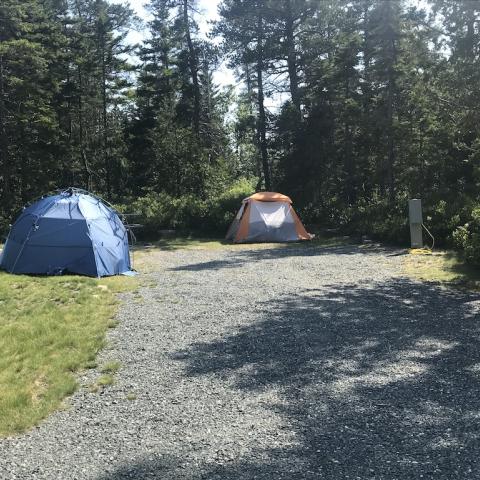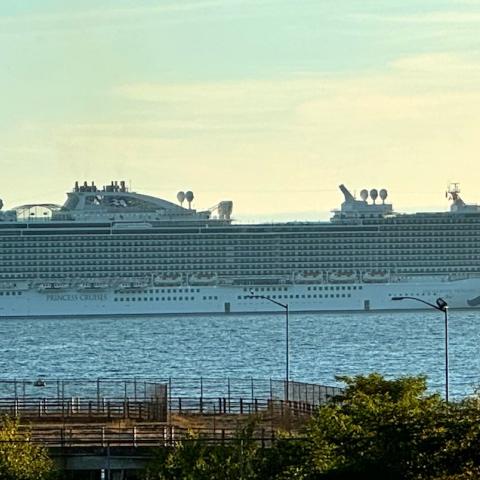
Should electric bikes and perhaps electric scooters be allowed on the carriage roads at Acadia National Park?/Rebecca Latson file
A story caught my eye the other day. It centered on electric bikes, and where they can roam in the National Park System. The story centered around Acadia National Park in Maine and raised the prospect that e-bikes might one day be allowed to travel the park's iconic carriage roads. Is that a good idea?
For now, the park is blocking the motorized bikes from heading down the carriage roads, which are restricting to muscle-powered cyclists, hikers, and equestrian travelers. But the AP story adds that "new rules are expected in the coming weeks."
“I’m hoping that they’re going to come to reality,” said one of the cyclists interviewed by the AP. “This will get more popular as time goes on.”
Well, there are a lot of popular things out there, but do they all deserve access in the parks? Remember Segways? What about those electric scooters that are all the rage in metropolitan areas? Will they be next to seek access to trails and areas normally off-limits to motorized vehicles?
In Canada, a pilot program is under way to test e-bikes on trails in Jasper National Park.
"There's a lot of places in the national park that are accessible by bike but maybe not to the entire general public due to limitations on fitness, etc.," Marc Vien, sales manager at Jasper Source for Sports, told CBC News. "But those e-bikes allow people to get to those places easily."
Tell us, travelers, how much access in the National Park System should electric bikes have?



 Support Essential Coverage of Essential Places
Support Essential Coverage of Essential Places







Comments
Depends on the definition of E-Bike. Your probably think of something more like a motorcycle or scooter. NOS could easily limit E-bikes by horsepower or top speed so those that would be allowed would let Folsom's with limited ability enjoy the parks.
Oh please. I own an ebike and they are not much different if at all from a regular bike. You just don't suffer when climbing hills. Joey do not ban people with disabilities from enjoying where you go just because you are physically fit to do so. Bad enough the Sierra Club supports designated wilderness in national forests. I've seen signs where wheelchairs are not even allowed because they are mechanical. I suppose they would rather the people get thrown off a horse and get more disabled.
Absolutely a good idea! E-bikes are quiet, thereby limiting any footprint or noise. It is a great way for people with disabilities to be able to see the PUBLIC park in all its glory. I know people who have knee issues, and have found a new lease on life due to electric bikes. If necessary, separte bike trails could be implemented like there is in California OR rules that they must be on the far right side of the trail, etc. It works great - they even have horses, bikes and hikers all on the same trail. PUBLIC lands mean just that - everyone should have the ability or chance to see what they can and not be discriminated against because they can't pedal on their own. I love the idea!
We have ridden e-bikes for 7 years. As we are now in our 60s and with bad knees and arthritis, they have made an incredible difference in our ability to enjoy parks and outdoor environments. A solution has already been provided in the classification of e-bikes. Only allow pedal assist bikes. If you need a belt and suspenders solunion, post a 20 mph speed limit, even though pedal-assist e-bike technology already has that limit.
At Acadia NP, signs on the automobile roads require a 3 foot distance from cyclists. Yet the park is increasingly popular, and its narrow roads have no shoulder. Banning a growing senior population and a surging popularity in e-bikes from Acadia's carriage roads only puts more people at serious risk. Most bike stores we talk with as that e-bikes have become a vitally important part of their market, possibly the only thing that keeps their doors open as many have told us. Banning e-bikes makes as much sense as banning cell phones in the early 90s.
in our trail riding experience on both regular and electric bikes, we find the people who complain loudest are those that typically don't follow other rules or courtesies, such as staying to the right, not blocking the trail, etc. If four people walking slowly take the entire width of a trail, we need to ring a bell, say "excuse me" or "to your left." Far too often, those trail-hogging walkers look indignant, shocked, and some even shout out a complaint as we try to pass - slowly I have a hunch those are many of the nay-sayers to e-bikes.
The Management of Acadia recently said that there would be a "slippery slope" after allowing e-bikes. Nonsense. A Pedal-Assist rule will ensure that scooters, Segways, electric motorcycles, etc won't qualify. And if the Park and Friends of Acadia truly examined the intent of John D Rockefeller, Jr and family as they donated the carriage roads, they could easily see that the quiet, pedal-assist e-bike would meet the donors' intention for a quiet absence of the polluting motorized vehicles of their day.
I too would love to be able to use an electric scooter as my handicap does nto allow me to walk well ! I think this should nto be too disruptive or noisy !
Please read and sign my petition on this very topic inspired by my recent visit to Acadia National Park:
http://chng.it/B99t2g7d
I have been biking the Carriage Roads in ANP for close to 25 years now. I am 80 years old now and have difficulties biking Carriage Roads. I would like to use an e-bike but the park bans me from Carriage Roads. I have to use the roads cars use. This is dangerous and is pure discrimination of elderly or handicapped people. The argument "no motorized Vehicles on Carriage Roads" is a joke, the park allows Snowmobiles on certain Carriage Roads !
Please, let us elderly enjoy the park and allow e-bikes where regular bikes are allowed.
so your vote would be for our disabled veterans and others with disabilities NOT to be able to use the same trails you ride on? Shame on you!